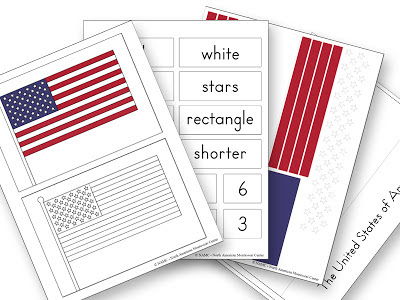
July 4th, 2013 marks the 237th Independence Day for the United States of America! To celebrate the Fourth of July in the Montessori environment, NAMC is providing a fun US Flag building and counting exercise that can be adapted to different ages and skill levels.
Montessori Flag Building and Counting Activities for The Fourth of July

To create this building, sorting, counting, and naming activity, we have prepared a complimentary printable with all of the parts that you will need. However, if you would prefer, this activity can easily be recreated using colored construction paper.
Building the US Flag

Included in this printable is a blank flag template, as well as all the colored components that are part of the flag of the United States. These pieces can be cut out and used to build the flag like a puzzle. Two control cards are also included: one in full color and one with just the outlines of the shapes, which can also be reproduced as a coloring work.
Counting Stars and Stripes
As a companion activity, children can use the component shapes and the included number cards to count all of the parts that make up the US flag.
Labeling and Comparing Shapes

Color and shape name labels are also included in our complimentary Fourth of July printable. Children can use these labels to sort the components into groups. For students who are ready for a greater challenge or more options for exploration, the shape, color, and number cards can be combined along with the included 'longer' and 'shorter' labels for a more complex exercise.
For more Independence Day inspired Montessori activities, please read through our previous blog posts:
- Independence Day and Cosmic Education Activities for the Montessori Classroom
- Exploring North American Independence With Montessori Activities
- Fourth of July Celebrations and Activities for the Montessori Classroom
- Celebrating American Independence Day with Montessori Curriculum Activities
As much as possible, NAMC’s web blog reflects the Montessori curriculum as provided in its teacher training programs. We realize and respect that Montessori schools are unique and may vary their schedules and offerings in accordance with the needs of their individual communities. We hope that our readers will find our articles useful and inspiring as a contribution to the global Montessori community.
© North American Montessori Center - originally posted in its entirety at Montessori Teacher Training on Tuesday, July 2, 2013.
© North American Montessori Center - originally posted in its entirety at Montessori Teacher Training on Tuesday, July 2, 2013.


0 comments:
Post a Comment
Have questions or comments? Let us know what you thought about this article!
We appreciate feedback and love to discuss with our readers further.